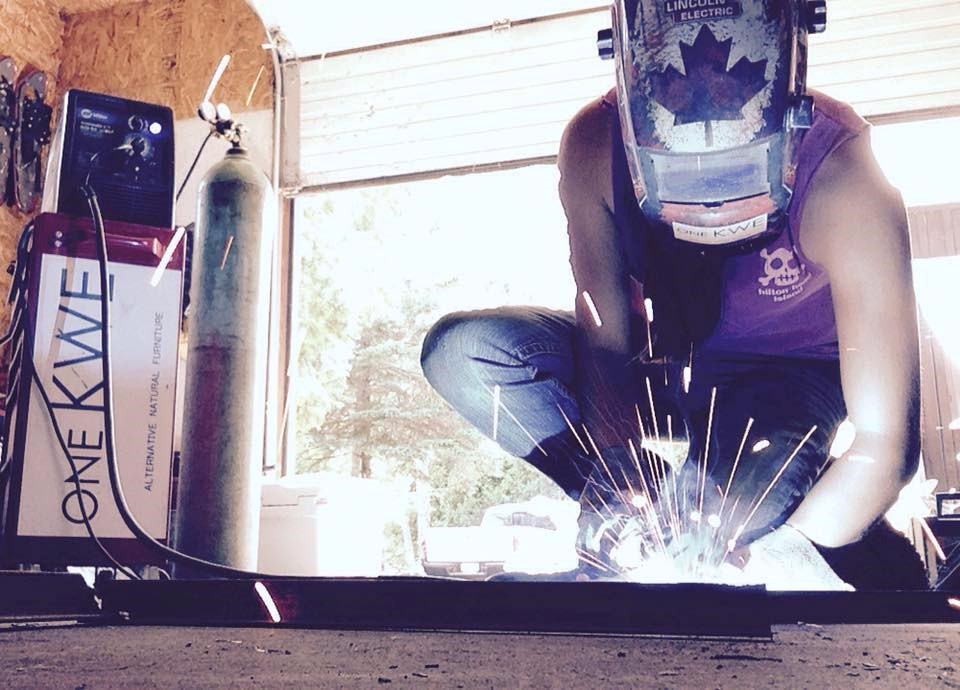Growing up in M’Chigeeng First Nation on Manitoulin Island, Kathryn Corbiere was always trying to prove that she could do anything the boys around her could do. That’s why, when her brother took up welding and pipefitting, she followed him into the trade.
But after graduating with all her tickets from the five-month welding course at Northern Welding Academy in nearby Sudbury, steady work proved elusive. So, instead, she went to work for herself.
“I was attempting to look for work in the welding field, in the industrial field, and nothing was coming up, because I was trying to stay local and there aren’t a whole lot of opportunities (locally),” Corbiere said.
“So I decided I’ll just try and work for myself, and with the help of M’Chigeeng and their self-employment program I was able to do so for the past two years.”
Today, the 26-year-old is the owner-operator at one KWE (kwe is the Ojibwe term for “woman”), the Mindemoya-based shop where she designs and builds contemporary metal and wood furniture, in addition to offering CNC plasma-cutting and custom fabrication.
Corbiere first started building furniture for her own use, but after posting photos of her creations online, soon developed a following of friends and family who admired her work.
Word spread, and she began fielding requests about custom projects for her “modern-rustic” furnishings.
Along the way, Corbiere partnered up with a local machinist, Rob Menary, who owns his own shop in Mindemoya and mentored her on the CNC plasma table, teaching her the finer workings of computer-aided design and manufacturing.
She quickly found a niche creating custom CNC cutouts — artistic signs and other décor that industrial shops don’t have the time, or the inclination, to provide.
“They’re more for the industrial purpose, or people that need parts for a machine,” Corbiere said. “So when a customer goes to a CNC shop and says, ‘I would like a bird cut out,’ they’re thinking, ‘That’s not what I do.’ But that’s what the customer wants.”
Some of her most popular items have been Christmas tree ornaments shaped like Manitoulin Island, or Manitoulin cutouts mounted on barn board.
“Over the past year, I think I’ve sold over 100 of them,” Corbiere said.
But she’s also done work for local businesses, fabricating a podium for the Ojibwe Cultural Foundation in M’Chigeeng, fashioning door pulls for a new Skater’s Edge sports store in Sudbury, and creating keg tap handles for the Manitoulin Brewing Company.
“I’ll still do welding jobs once in a while — I’ll get calls for repairs here and there on stoves,” Corbiere said. “But my main focus is on the artful stuff.”
With orders coming from as far as Markham this past year, she’s hoping to expand her online presence, setting up a web store where people can choose their preferred metal, design and font, and place orders online.
But her main focus is on relocating her business back to her home community, where she hopes to operate a welding shop — eventually adding a router table, a plasma table and a CNC mill — along with a small retail store to showcase and sell her products.
She even foresees hiring locally, offering an apprenticeship to someone from the community who’s interested in learning the welding trade.
Corbiere knows she’s a bit of an anomaly — a young woman operating her own welding shop and Aboriginal to boot — but she’s a fierce proponent of following your own path and encourages more Aboriginal youth, of any gender, to pursue a career in the skilled trades.
Use all the resources available to you, Corbiere advises, and don’t shy away from recruitment fairs and career days, which can open up new, previously unfamiliar opportunities.
Beyond that, support the local economy, said Corbiere, who sources her raw materials locally, and form lasting relationships that will help drive your business and those around you.
“I think what’s important is making partnerships with people and staying true to them and just being a genuine person and giving back,” she said. “And don’t be afraid to pursue areas that are foreign to you.”




